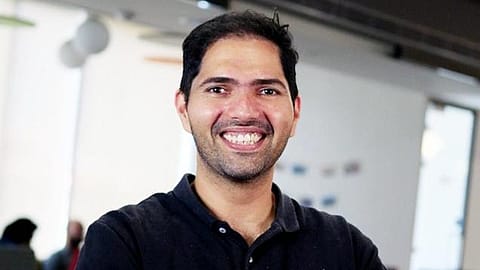Lessons from Bybit to WazirX hacks: How Mudrex is betting on security, stablecoins, and compliance to build user trust
As exchanges continue to face mounting security threats, homegrown players like Mudrex are ramping up their defences.

With crypto adoption on the rise, digital assets remain one of the most heavily targeted by hackers. In four of the last 10 years, 2018, 2021, 2022, and 2023, over $1 billion worth of crypto was stolen annually. In 2024 alone, stolen funds rose 21.07% year-over-year to $2.2 billion, according to Chainalysis.
As exchanges continue to face mounting security threats, from Bybit's $1.4 billion hack this year to WazirX's $231 million exploit last year, homegrown players like Mudrex are ramping up their defences with robust, layered security protocols. With over 3 million users on board, the Bengaluru-based exchange combines market-standard insured custodianship with its reserves to cushion any potential blow. "The most important thing is not to get hacked," says Edul Patel, CEO and co-founder, "but if it happens, we’re built to absorb the shock."
Amid the global acceptability of crypto, Mudrex has seen its user base expand by over 200% this year over the past year. The company caters to users based in India, though it has a "strong and growing presence" across the EU region. The company had raised over $23 million in funding, valued at $93 million as of the last round in 2022.
Patel, in an exclusive conversation with Fortune India, says he and his co-founder, Alankar Saxena, believed in the power of crypto since the very start, when they launched the company 7 years ago. He says blockchain has the power to transform financial services and make them more accessible, faster than traditional formats could ever allow. "When we started, the technology just wasn't there...Transaction costs were high, and regulatory acceptance was minimal compared to where we are today."
Things have since changed dramatically, he says, adding that crypto transactions are now near-instant. Patel now sees blockchain as a rapidly growing infrastructure for real financial services.
Bullish on stablecoins for India's payments system
The Patel-led company is also bullish on stablecoins and sees them as the future of India's payments system. India is the world's largest remittance market, receiving more than $129 billion in 2024. Yet, the cost of transferring money from overseas remains high, around 3% to 7%, amounting to $3.72-$8.68 billion annually in fees, conversion charges, and payment processing costs. Stablecoins could change that, asserts Patel.
Recommended Stories
He says the country’s fintech ecosystem, which includes over 10,000 startups and is projected to reach a $420 billion market size by 2029, can use the emerging infrastructure to build Web3-based financial products. "A regulated stablecoin market could empower Indian fintechs to build on safer, interoperable infrastructure."
Patel informs that Mudrex supports the widest variety of crypto assets available to Indian users, over 650, more than platforms like Binance, YBuild, or Coinbase. It also offers over 500 different futures contracts, seamless crypto deposit and withdrawal options, and instant transfers via UPI and NPS directly to bank accounts.
Security boost post-WazirX incident
In July 2024, WazirX, which was India's biggest crypto exchange, faced a security breach where hackers siphoned off over $230 million in crypto assets due to compromised private keys linked to self-custodied wallets, which were being managed by the exchange.
(INR CR)
After the WazirX incident, says Patel, the industry rallied to improve security standards. The Bharat Web3 Association, of which Mudrex is a key member, formed a group of CISOs (Chief Information Security Officers) to establish best practices and help smaller players strengthen their systems. "Unlike WazirX or Bybit, which manage custody themselves, we use global insured custodians, specialists who also work with Binance and other large institutions. This gives us access to their infrastructure, certifications, and insurance coverage, making Mudrex a much more secure platform for users."
Considering a rise in such incidents, Mudrex has ramped up its threat detection and monitoring systems post-recent industry breaches. "We now run internal audits every minute, up from every 30 minutes earlier, to get near real-time visibility into our systems," says Patel.
Beyond that, Mudrex has also implemented strict security controls: wallet movements are restricted to whitelisted addresses, with layered transaction, hourly, and daily limits. "Even if there's a breach, the amount that can flow out is minimal and quickly recoverable," he adds. "It's all about reducing exposure through diversification, access controls, and tightly capped flows. There is an audit mechanism that runs in-house every minute that tells us the near real-time status of all our auditing, that's something new that we put in place."
Battling sophisticated cybercrimes
Hackers linked to North Korea have become notorious for their sophisticated and relentless tradecraft, often employing advanced malware, social engineering, and cryptocurrency theft to fund state-sponsored operations and circumvent international sanctions. In 2023, North Korea-affiliated hackers stole around $660.50 million across 20 incidents; in 2024, this number increased to $1.34 billion stolen across 47 incidents.
Cybercriminals are everywhere, and the threat depends on how big a target you are and how strong your defences are, says Patel. "Groups like North Korea's Lazarus are a concern; they've targeted not just crypto exchanges but also pulled off one of the biggest banking heists in history, stealing nearly $1 billion from the Bank of Bangladesh by exploiting the SWIFT network."
While giants like Binance, Bybit, and Coinbase naturally attract more attacks, Patel notes that all asset holders are on the radar. "It's about the sophistication of your security versus theirs."
Speaking about the state of the crypto regulatory landscape in India, Patel says the industry is "extremely well-prepared" for regulatory changes with confidence. "Mudrex already complies with all FIU regulations in India and has built a global regulatory footprint. It is registered as a VASP in Europe, licensed in the UK, and is in the process of securing licenses in Canada and Australia."